What NOT to do on a Sales Call! – In the aviation industry, our clients often have a limited number of prospective clients. They could be limited by geography, resources, or the type of plane they fly. So our clients can’t afford to make a bad first impression – and neither can we. And yet, we have to make sales calls! On the phone! Where things can go so badly, so quickly.
So, here’s the lowdown on what NOT to do in that critical first sales call with a prospective customer.
Transcript – What NOT to do on a Sales Call!
Paula Williams: Welcome to aviation marketing Hangar Flying Episode number 48, What NOT To Do On A Sales Call. I’m Paula Williams.
John Williams: And I’m John Williams.
Paula Williams: And we are ABCI, and ABCI’s mission is-
 John Williams: To help all you folks out there sell more stuff and products and services in the aviation industry.
John Williams: To help all you folks out there sell more stuff and products and services in the aviation industry.
Paula Williams: Exactly. So, we do have a hashtag, #AvGeekMarketing, and we do reply to every tweet. We try to watch that on all of the social media. So, if you have any questions, comments, or anything else on aviation marketing or aviation sales, that you’d like to [LAUGH] ask about this episode, or any other episode, we’d love to have you participate.
So, that will be fun. All right, so, sales calls. Everybody hates sales calls, right?
John Williams: Well, but they shouldn’t, if its done properly, they should enjoy it.
Paula Williams: [LAUGH] Right, but the people that make them hate them, the people that get them hate them. Nobody that I know of actually, at this point in time, enjoys making sales calls on the phone.
John Williams: Well, I don’t know.
Paula Williams: Okay.
John Williams: I’ve run across one or two that don’t seem to mind.
Paula Williams: [LAUGH] Okay, they’re freaks of nature.
John Williams: [LAUGH] That may be, however.
Paula Williams: Most of us are not crazy about sales calls, but the fact remains that sales calls work.
And they are pretty much necessary for any business, in a business to business situation, especially in an aviation in particular.
John Williams: I think you got to borrow a phrase from one of our CD’s is, not our CD’s but one we listen to is you’ve gotta get your mind right.
[LAUGH]Paula Williams: You’ve gotta get your mind right. Exactly. That’s Tony Horton in the [LAUGH] P90X exercise program, very 1990s or [LAUGH] 2000s or whatever, but-
John Williams: Whatever, but he’s got a point.
Paula Williams: Yeah. Exactly. So, in Patrick Henry Hanson’s book Power Prospecting, he says that $380 billion in sales revenue are generated by sales calls, and what he calls cold calls.
Of course, we have a slightly different idea of what a cold call is, and we don’t recommend it. But we think every sales call should be at least lukewarm, and we’ll talk about that in a minute.
John Williams: Of course.
Paula Williams: But most transactions in B2B sales involve some sales calls.
And I think just about every purchase that we’ve made in B2B, and or in aviation have involved some sales calls. Is that correct?
John Williams: Of course.
Paula Williams: Yeah, Patrick Henry has in his book, he also calls this the grit and the oyster. Everybody wants the pearls [LAUGH] but nobody wants the grit.
It’s the thing that causes irritation, but it certainly gets results. And if you do it correctly, it doesn’t cause that much irritation, unless you’re just irritating people by reading their phone, which is a fairly minimum amount of irritation. But there are things that irritate people a lot more than they need to, and they don’t necessarily result in pearls, they result in getting spit out, right?
[LAUGH]John Williams: [LAUGH] Yes.
Paula Williams: Okay, so What NOT to do on a Sales Call! We have three “don’ts” for the purpose of today’s podcast, and the three don’ts are one, don’t show up unprepared. Two-
John Williams: Show up meaning, make the call.
Paula Williams: Exactly [LAUGH]. Two, don’t talk too much. And three is not making calls at all.
John Williams: Yeah, exactly.
Paula Williams: Most importantly, right? Okay, so the first one, don’t show up unprepared. And when we mean show up, meaning show up on the call, or dial the phone, or show up in a situation where you’re obviously not mentally, physically, emotionally. [LAUGH].
John Williams: You shouldn’t make, you shouldn’t dial the phone anymore unprepared than if you just traveled from east coast to west to make a sales call on a client.
Paula Williams: Exactly, right. Even if you only have fifteen minutes to prepare for a sales call, you certainly can do a very credible job of getting to know the customer. And you certainly should know your own product and your own company a lot better than most people who make sales calls.
And I think that’s the number one most irritating thing about sales calls is when people waste your time, right?
John Williams: Yeah, they show up unprepared, or they don’t know their product.
Paula Williams: Exactly. I had a sales call, it was actually yesterday morning from a very polite and courteous young lady who was selling, she was selling credit card processing systems, and she asked a couple of questions, but basically, she just wanted to push her product.
And I asked her a couple of questions, and they were very simple questions. I mentioned a very well known competitor in the market of credit card processing, and also two very well known software systems that we use for e-commerce on the web and asked her number one, how do your prices compare with this competitor?
And two and three, do you integrate with either of these two software systems? She didn’t have answers for any of those three questions, which tells me that she either doesn’t know her product, doesn’t know the competition, doesn’t know what things she’s likely to be asked, really hasn’t prepared for this call.
John Williams: Right.
Paula Williams: So, she says well, let me find out and call you back. And I said well, that’s great, but don’t bother calling me back, unless the answers to those three question is yes. Number one, will it be a significant cost savings over what we’re using now?
Number two, does it integrate with infusion soft? Number three, does it integrate with-
John Williams: These other things.
Paula Williams: Yeah, exactly, so. And she never called back. [LAUGH]
John Williams: [LAUGH] Which answered the questions.
Paula Williams: Which does answer the question. But I was trying to save her time as well as mine.
And I think that’s the most irritating thing to aviation executives especially, they’re all very busy people. And sales calls often end up being a huge black hole of time as you’re educating the sales person.
John Williams: Yeah.
Paula Williams: Which is crazy.
John Williams: There’s no reason for that.
Paula Williams: Right.
Okay. So, we say there is never an excuse to make a cold call. You need to know two things, one is the company, and the other is your own product and your own.
John Williams: Let’s back up for a minute.
Paula Williams: Okay.
John Williams: Do you think that if somebody, if you were in the market for, and somebody approached you to sell you a golf stream G550 or 650, that they would be unprepared?
Paula Williams: [LAUGH]
John Williams: And there’s no difference in whatever product you’re selling. You should treat it the same way.
Paula Williams: Especially in the aviation industry.
John Williams: Absolutely.
Paula Williams: People really do expect to be respected. And expect to have their time respected. And the way that you show that is by doing your homework and-
John Williams: We digress, I’m sorry.
Paula Williams: That’s okay, no, that’s absolutely on point, so you can [LAUGH] digress mostly whenever you want.
John Williams: Mostly?
Paula Williams: If not, I’ll kick you, so. Under the microphone people can’t tell, right? Okay. So, the first thing is you want to know the customer, and there are lots of ways to find out what you can about the customer.
You should never call somebody and ask them, so, how many employees do you have? You should know this stuff. If it’s a public company, there is no reason you shouldn’t have all of the data that’s about this company from their website, from Google, you should know something about this person from LinkedIn, you should know what their title is, you should know how long they’ve had that job.
There’s a lot of things that there’s really no excuse for asking questions that you don’t know the answer to, right?
John Williams: Matter of fact, you shouldn’t ask a question you don’t already know the answer to.
Paula Williams: That’s not necessarily true. Because you can ask how long have you had this problem?
Something that you wouldn’t know, or there’s lots of questions you could ask that you don’t know the answers to, but not right off the bat, and you certainly should know anything that’s already public information. Right? Okay. And we like to do some kind of warm up marketing. We’re a marketing company.
We emphasize that sales, we think is actually a natural component of marketing. So, we like to, before a call is made, make sure that there has been some kind of contact with this person. Whether that’s an email, a LinkedIn contact.
John Williams: Yeah, but you’ve been in marketing your whole life, damn near.
And this comes natural to you. The people you’re talking to, it doesn’t come natural to.
Paula Williams: Right.
John Williams: So, it needs to come natural to them.
Paula Williams: Right, and there’s nothing technical or ridiculous about this. Basically, you find your contact on LinkedIn. You send them a message saying I’d like to introduce myself, my company, and here’s why it might be a good idea for us to talk.
And I’ll give you a call Friday at four, or whatever the situation is. And that way they’re expecting your call, and they have the opportunity to avoid you if they want to [LAUGH], or to take your call if they want to, or to write back to you and say I’m out Friday, let’s talk Tuesday.
So, lots of things that you can do that will help you warm up a cold call. The other thing is that you need to, this should go without saying, right?
John Williams: Nothing goes without saying.
Paula Williams: Nothing goes without saying. You should know your own product and your own company, right?
You should be able to very articulately explain your unique selling proposition. You shouldn’t be stumbling over your words when somebody asks you a question that should be a fairly common or frequent question. You should know your 15-seconds sales pitch pretty well so that you’re not spending two minutes before you had the customer talk.
[LAUGH] And ask questions and things like that. You should have a list of questions that you’re asked, and every time someone asks you one, you should write down the answer so that you have that ready next time it’s asked. And also, the common objections to your product or service so that you have a clue or have a strategy about how to respond to those things.John Williams: Yes.
Paula Williams: Right. Do most of the people you talk to, I know you probably get more vendor calls than I do. Do most people know this stuff or not?
John Williams: Interestingly enough, it depends upon the, I was going to say value, but I probably should use the word cost to the product.
Paula Williams: Okay.
John Williams: If you get in something that’s in the multi-thousands dollars and up, yes, they know.
Paula Williams: Good, that’s a good thing.
John Williams: The stuff that’s most frequently sold, which is thousand to 20 or $30,000 range, not so much.
Paula Williams: Right, yeah, exactly.
John Williams: And those guys to see they’re not treating it like the major players are, and they need to.
Paula Williams: That’s correct. All right, so that is a [LAUGH] don’t number one is don’t show up unprepared. Don’t number two is don’t talk too much.
John Williams: Except for now, I mean, we can talk as much as we want.
Paula Williams: Yeah, exactly.
John Williams: [LAUGH]
Paula Williams: A one way form of communication [LAUGH] and I’ve been accused of talking too much.
John Williams: You can say blah, blah, blah, just like on the screen, right?
Paula Williams: Exactly. So, why do sales people talk too much?
John Williams: There’s lots of reasons. Mostly they’re probably nervous, and they’re scared about not making the sale.
Paula Williams: Right.
John Williams: Hopefully they’re excited about the product that even so, they need to slow down and be real.
Paula Williams: Right. And the number one thing I think here is to remember that a sales call is not about you. It’s not even about your product. It’s about the customer, right?
John Williams: Yes.
Paula Williams: So, if you are nervous, or if you have a lot to say, you’ve done this big preparation, you have this enormous script.
Then you’ve done your preparation wrong. Just because you know something doesn’t mean you have to say it, and just because it’s on the sheet of paper, doesn’t mean you have to say it.
John Williams: And actually, the more you do it, the easier it gets to be on target.
Paula Williams: And that is true. Right. So, how not to talk too much. The thing number one really is to make lots of calls.
John Williams: What I just said.
Paula Williams: Exactly. And there is three reasons that making lots of calls reduces this. The first one is that you get more practice, and so, you get more comfortable.
Number two is you have more opportunities to make sales, so you’re making more sales, you’re making more money, you’re feeling more comfortable. You’re not worried about your rent and so on. And of course, less anxiety about making the calls, and less anxiety about your financial situation. So.
John Williams: Yeah, yeah.
And actually, that’s right on target, because some of the folks that have sold things to us.
Paula Williams: Mm-hm.
John Williams: They tell me upfront, says all I want from the end of this discussion is a yes, or a no, or what do we do next.
Paula Williams: Mm-hm.
John Williams: And then some of them will go one step further, and say look, it’s okay to say no.
I mean really, does it look I need your sale for my lunch money? [LAUGH]
Paula Williams: Right. Exactly. So you have to have that attitude of I really don’t care whether I make the sale at all. I mean, of course you do.
John Williams: You do of course, but you have to-
Paula Williams: Care more about the customer.
John Williams: Exactly.
Paula Williams: And whether this is a good fit for him or not. Because if you make a sale [LAUGH] especially if you own the company, you know this very well. If you make a sale to the wrong person, that is worse than not making a sale at all, right?
John Williams: Absolutely.
Paula Williams: Okay, and you’ve probably all seen the poem, dance like nobody’s watching, love like you’ve never been hurt, sing like there’s nobody listening. Work like you don’t need the money, and live like it’s Heaven on Earth. We could add a line to that. Sell like you don’t need the money.
John Williams: [LAUGH]
Paula Williams: I make it a point not to review our finances before [LAUGH] going into making a bunch of sales calls. I usually do those on Fridays when people are in a more relaxed mood and things are fairly, it’s a little bit more laid back than a usual business day, and I’m feeling better about things because I’ve made it through the week and so on.
John Williams: This is a quick little story.
Paula Williams: Yeah.
John Williams: 20 years ago, when I first met her, and we were both working for competing consulting firms of the same client, but the client wanted to hire her, and I remember the guy saying, he said John, he said, I don’t understand what we can do to offer her.
She didn’t obviously doesn’t need the work. She doesn’t need the money.
Paula Williams: Little did he know [LAUGH].
John Williams: Well, it’s just the way she portrayed herself. She didn’t lie about it. But she portrayed herself as being quite successful and imminently in control of finance and didn’t need the money.
And I just sort of it, I said, well, I don’t know, I suspect you can probably come up with something, and ultimately they did, and they hired her. But the point was, before all that, they were of the opinion that she didn’t need the money. And she was working there just so she could have some social interaction.
Paula Williams: Wow, I had no idea that I had made that impression, but that [LAUGH] was a good one.
John Williams: [LAUGH]
Paula Williams: I mean, it really does help if you live below your means. You don’t drive the latest car. You don’t wear the gold plated shoes or whatever. I mean, there’s lots of things that you can do to make yourself more financially comfortable.
And John is really fantastic at making it so that we are not concerned at any given point about cash flow, because he can make things happen with the resources that we have without giving me anxiety [LAUGH] before making sales calls. So that really is very, very helpful. And I know that seems unrelated, but it is very related once you get on the phone, because people can smell desperation.
John Williams: Yes they can.
Paula Williams: And so, anything that you can do to lower your anxiety level about your financial situation, do that, right?
John Williams: Yeah.
Paula Williams: Pay off your stinking bills, and follow the financial of whoever it is, whatever financial guru it is that you follow.
John Williams: You remember Dennis, the guy we both worked for, right?
Paula Williams: Yeah, I remember Dennis.
John Williams: He was the one that told me that.
Paula Williams: Wow. Okay. Well, we had him fooled.
John Williams: [LAUGH]
Paula Williams: At the time, yeah, Needed the money [LAUGH].
John Williams: [LAUGH]
Paula Williams: That was years ago, and long ago in a galaxy far, far away. So, all right, so, we covered don’t number one and don’t number two.
Don’t number three is Not Making Calls, and this is the worst one. Coming into marketing, part of the reason for that is because I am not a huge fan of making sales calls. Not my favorite thing. I’m getting better, but we have actually worked with clients who had people who were so afraid of making sales calls that they actually lied about it.
It took us about four months to realize that this person was being dishonest about the number of calls that were actually being made, and was actually falsifying some documents and doing other things, it took us a while to figure that out, because we believed him.
John Williams: And it took a while longer to convince the exec.
Paula Williams: Right, to get things where they needed to be. Because there are people that are so afraid of making sales calls, and you may have employees like this that are ordinarily just straight as an arrow, but when it comes to doing what you ask them to do with sales calls, they either can’t, or won’t, or-
John Williams: Shouldn’t, maybe. [LAUGH] Yeah, whatever.
Paula Williams: Whatever the case may be. And you say, whenever you have extra time, make sales calls. They are probably not. Unless you have some way of making sure that there is some accounting for the calls that they’re making, and the results of each call.
And you really do need to make sure that that is double-checked, even from people that you know very well, and that you trust on every other possible thing. People that you would trust with your life and your kids and your money and everything else are just a little weird about sales calls.
It’s a strange thing.
John Williams: Even sales guys need sales managers to be accountable to.
Paula Williams: Exactly [COUGH] and what typically happens more than dishonesty more often than that, and I do this, too. Just I am too busy doing the things I don’t need to do in order to avoid doing the things that I actually should be doing.
John Williams: Tell me it isn’t so.
Paula Williams: [LAUGH] It is absolutely true. I will organize, the office, I will, straighten things, I will build pages, I will do all kinds of things. I would rather mess with spreadsheets or landing funnels or HTML than make sales calls. But-
John Williams: What’s a landing funnel?
Paula Williams: What’s a landing funnel?
John Williams: You said you’d rather mess with a landing funnel. I want to know what that is.
Paula Williams: It’s an online thing where you request a, it’s a call to action funnel kinda thing. It’s just another word for that.
John Williams: Okay. Fine.
Paula Williams: Anyway, there are lots of things that I would much rather do than make sales calls.
And I typically tend to fill my schedule with those things unless I catch it. And because I am the direct, I am directly accountable for sales. As well as everything else, I can only get away from it for so long [LAUGH] before I actually have to make sales calls.
So, I do it myself, so I definitely recognize that when I see it in other people. Right?
John Williams: Uh-huh.
Paula Williams: Okay. Another thing that you can do is have someone else do it, which doesn’t always work. The higher up the food chain the person is who’s making sales calls, the more effective they will be.
And I know this sounds like not the best use of time, but, and you may want to have somebody else doing the initial sales calls and doing the qualification and then handing them off to you if you’re the owner of the company or the CEO or whatever the situation is.
But we really do think that the role of a CEO is a marketing role. I mean, you’re basically representing the company to the world. And if you are doing sales of any size, transactions at all, or sales of things to large entities especially, you really do need to be involved in the sales process.
Because you have credibility in your organization that nobody else is going to have. And whether you need the level of knowledge that you have in a sales call, you can debate that one way or the other. But having the authority and the perceived authority to be saying what you’re saying and making the promises that you’re making and the credibility that you have that comes with that position the better, right?
John Williams: Yes.
 Paula Williams: Okay. So you can always get somebody else to do your screening calls and do other things, but you want to make that as qualified a person as you possibly can. Here we have a picture of a dog making sales calls, which is adorable, but probably not very effective, right?
Paula Williams: Okay. So you can always get somebody else to do your screening calls and do other things, but you want to make that as qualified a person as you possibly can. Here we have a picture of a dog making sales calls, which is adorable, but probably not very effective, right?
John Williams: [LAUGH]
Paula Williams: Okay. All right, so, how do you set up that accountability to make sure that people are actually doing the sales calls that you’re expecting them to do? And you do need to set this up so that someone in your organization is responsible for making sales calls.
And someone else in your organization is responsible for making sure that they made the sales calls, right?
John Williams: That’s the sales manager, or somebody that fulfills that function, cuz everybody needs to be accountable to somebody.
Paula Williams: Exactly, exactly, so there’s always a double check, check and balance however you want to put that.
And trust, but verify the rating thing.
John Williams: You are the sales manager, and that means your sales guys are accountable to you. You’ve got somebody you’re accountable to.
Paula Williams: That is true. Right, so, you also want to schedule your sales calls. I schedule myself for sales calls, because otherwise I won’t do it.
I will find some reason to not get them done. You want to have a call log so that you are set up to do your calls, and that can come from your CRM, or it can be something that’s separate, whatever makes you comfortable with that. You can use an app in your phone, you can use, Infusion Soft is what I do, I set up the calls as a pipeline, and if you’re one of our clients, we can help you set that up in your CRM to make sure that those work the way they’re supposed to.
Most CRMs have reports. A weekly activity report or a sales activity report, something like that, that you can pull up and review. And talk to your sales guy about it, don’t just let it go as good or bad or anything else. Most really good sales people thrive on input, good, bad or otherwise, they want to know how am I doing?
How am I holding up to your expectations? Besides the fact that it might be for some of our clients who are brokers with very large deals. Sometimes it’s months in between making sales. So, they don’t get that kind of reinforcement. They need some kind of external reinforcement from somebody else in the company besides themselves.
Okay, here’s what you’re doing, this is great. What are your strategies for dealing with this other guy? How are we going to approach this person? How are we going to approach that situation? They really need somebody to bounce ideas off of and make that something that you schedule on a regular basis too.
So, weekly sales meetings are a great way to do this as well. Okay, so download the sales call tip sheet, which is available from ABCI1.com/SalesCalls, that’s Alpha Bravo Charlie India Number One dot com forward slash sales calls, all one word. It has a great checklist for setting up your sales calls, and it’s what I use, actually [LAUGH] .
That’s why I put it together for everyone else, because it works for us, and that really is kind of the test. And you may also want to see Episode 3 for three ways to build your prospect list. Episode 4 for a three ways to improve your offers, and Episode 12 for Prospecting, Calls to Action & List Building.
And next week in Episode 49, we’re going to be talking about prospecting or building your list using LinkedIn, which will be a lot of fun, right?
John Williams: Well.
Paula Williams: [LAUGH]
John Williams: [LAUGH] Helpful and useful, at least.
Paula Williams: Exactly. So, go forth and sell more stuff.
John Williams: Yep, America needs the business, so says Zig Ziglar.
Paula Williams: Right, exactly. Subscribe to our podcast on iTunes, Ditcher, or Google Play, and please do leave us a review
d.getElementsByTagName(‘head’)[0].appendChild(s);..

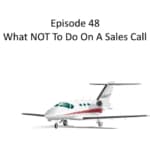

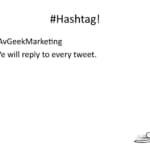

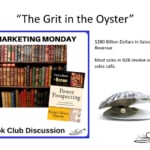
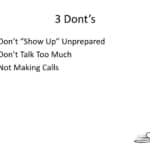

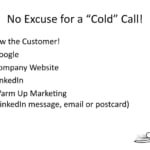

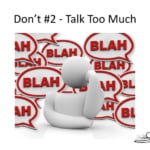
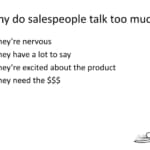
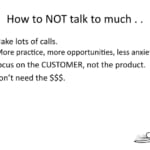
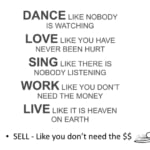
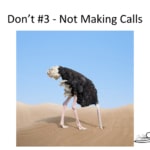
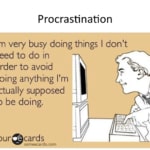

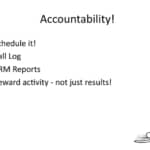

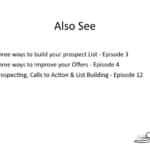
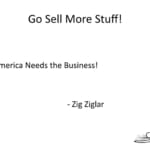

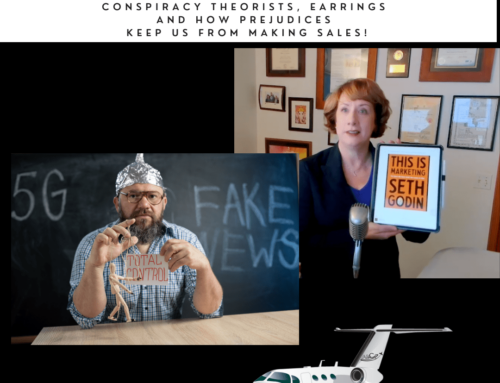

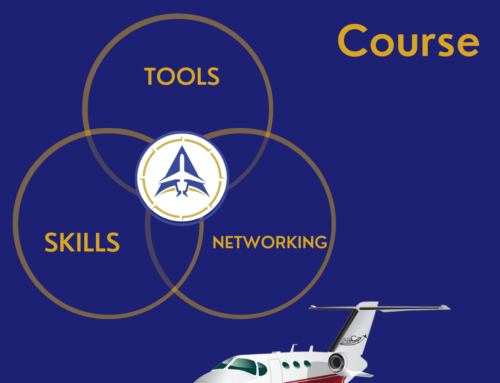
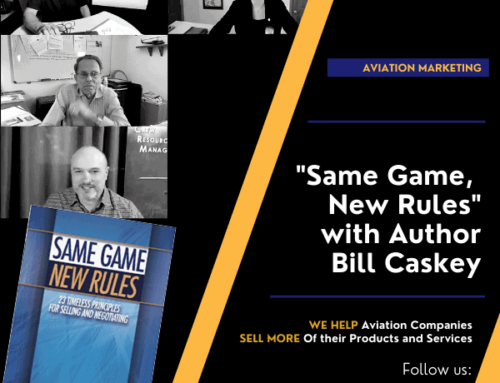
Leave A Comment